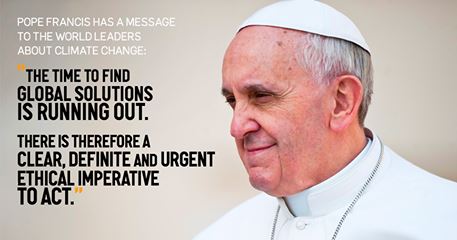Laudato Sí

Ignited by Pope Francis’ encyclical, Laudato Sí: On Care for our Common Home, President Colleen M. Hanycz committed Xavier University to participate in the Pope’s Seven-Year Journey towards integral ecology and to develop strategies which “demand an integrated approach to combating poverty, restoring dignity to the excluded, and at the same time protecting nature” (LS 139). The Laudato Sí Initiative has been named as a major component and goal of the eight-year University Strategic Plan.
This commitment requires the University to create a Laudato Sí Action Plan that addresses each of the seven Laudato Sí goals. A Steering Committee has been formed to lead Xavier's efforts in developing a comprehensive Action Plan. Guided by an executive committee, working groups, under the leadership of a faculty-staff team, will create goals and plans for each of the seven goals.
Executive Committee
- Bill Madges (Brueggeman Center; Theology)
- Linda Schoenstedt (Leadership Studies; College of Professional Sciences
- Bob Sheeran (Facilities; Financial Administration)
- Mich Nyawalo (Gender and Diversity Studies Program)
- JP Parham, II (Athletics)
Response to the Cry of the Earth
The Response to the Cry of the Earth is a call to protect our common home for the wellbeing of all, as we equitably address the climate crisis, biodiversity loss, and ecological sustainability. Actions could include the adoption of renewable energies and energy sufficiency measures, achieving carbon neutrality, protecting biodiversity, promoting sustainable agriculture, and guaranteeing access to clean water for all.- Becki Lanter (Director: Plant Operations)
- Brent Blair (Biology)
Response to the Cry of the Poor
The Response to the Cry of the Poor is a call to promote eco-justice, aware that we are called to defend human life from conception to death, and all forms of life on Earth. Actions could include projects to promote solidarity, with special attention given to vulnerable groups such as indigenous communities, refugees, migrants, and children at risk, analysis and improvement of social systems, and social service programs.
- O'neil Van Horn (Theology)
- Audrey Calloway (Marketing/Communications)
Ecological Economics
Ecological Economics acknowledges that the economy is a sub-system of human society, which itself is embedded within the biosphere–our common home. Actions could include sustainable production and consumption, ethical investments, divestment from fossil fuels and any activity harmful to the planet and the people, supporting circular economies, and prioritizing care labor and protecting the dignity of workers.- Justin Roush (Economics)
- John Mercer (Procurement)
Adoption of Sustainable Lifestyles
The Adoption of Sustainable Lifestyles is grounded in the idea of sufficiency, and promoting sobriety in the use of resources and energy. Actions could include reducing waste and recycling, adopting sustainable dietary habits (opting for a more plant-based diet and reducing meat consumption), greater use of public transport, active mobility (walking, cycling), and avoiding single use items (e.g. plastic, etc.).- Debbie Vankuiken (Nursing)
- Jenn Thornton (Office of the Controller)
Ecolgical Education
Ecological Education is about re-thinking and re-designing curricular and institutional reform in the spirit of integral ecology in order to foster ecological awareness and transformative action. Actions could include ensuring equitable access to education for all and promoting human rights, fostering Laudato Si’ themes within the community, encouraging ecological leadership (students, teachers), and ecological restoration activities.- Donna Hutchinson-Smyth (Early Childhood Education)
- Anne Ryckbost (Library)
Ecological Spirituality
Ecological Spirituality springs from a profound ecological conversion and helps us to “discover God in all things”, both in the beauty of creation and in the sighs of the sick and the groans of the afflicted, aware that the life of the spirit is not dissociated from worldly realities. Actions could include promoting creation-based liturgical celebrations, developing ecological catechesis, retreats and formation programmes, etc.- John Sniegocki (Theology)
- Eric Sundrup, SJ (Bellarmine Chapel; Board of Trustees)
Community Resilience and Empowerment
Community resilience and empowerment envisage a synodal journey of community engagement and participatory action at various levels. Actions could include promoting advocacy and developing people’s campaigns, encouraging rootedness and a sense of belonging in local communities and neighborhood ecosystems.- Anas Malik (Political Science)
- Liz Blume (Community Building Institute)
Existing Xavier Sustainability Groups
- XSS (a student sustainability group) XAVIER STUDENT SUSTAINABILITY
- Climate Change Action Workshop
Climate Change Studies
The Intergovernmental Panel on Climate Change, which is the United Nations body for assessing the science related to climate change, issued in February 2022 its report on the impacts of climate change and describes vulnerabilities, capacities, and limits of the natural world and human societies to adapt to climate change.